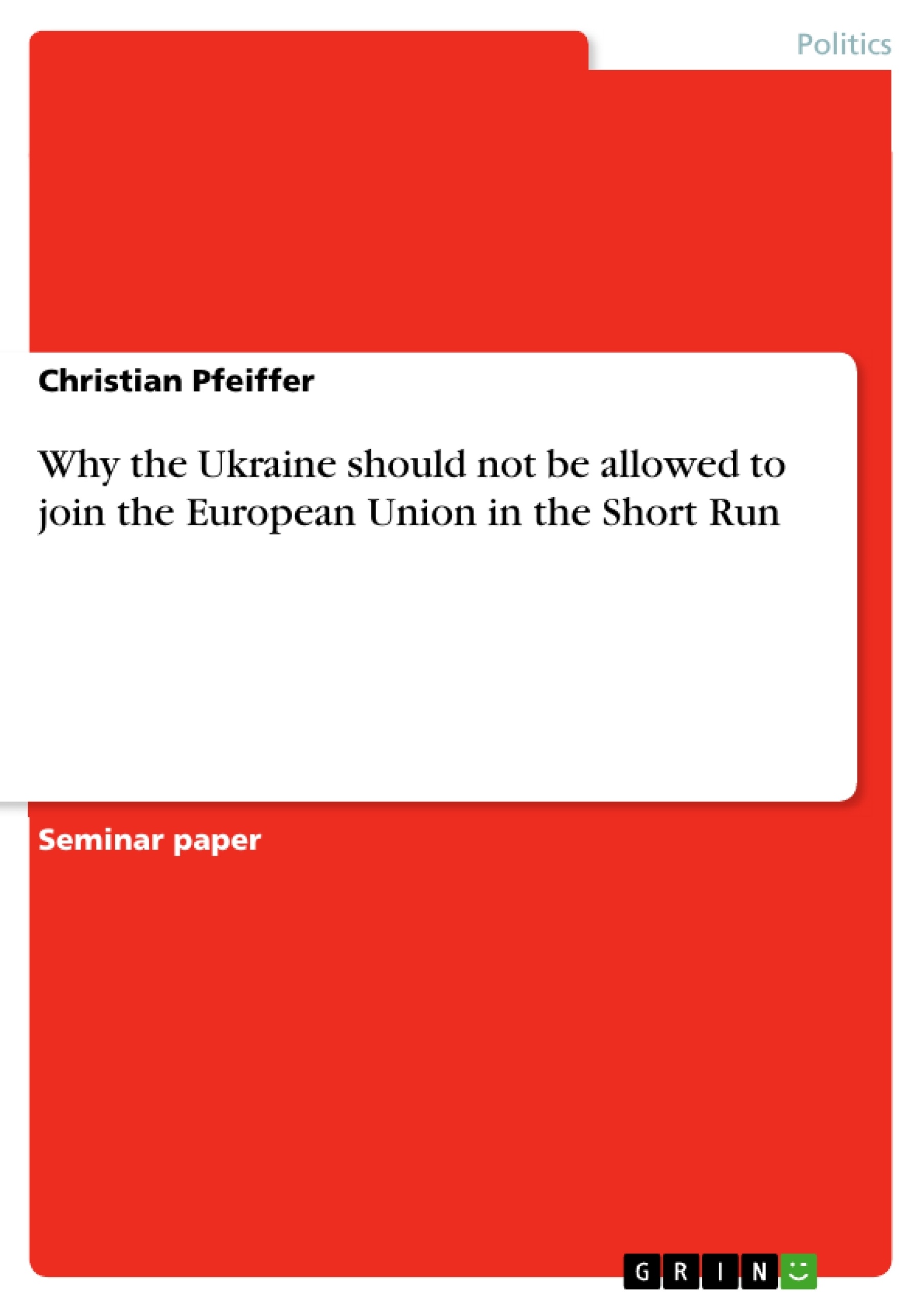With the election of Viktor Juschtschenko as President of Ukraine in December 2004 a new issue has been opened in the integration process of the European Union: Shall the Ukraine become a member in the near future?
While Juschtschenko demands this since his inauguration in January 2005 the EU still reacts very reserved according to that issue. It did not make a final decision yet how to deal with Ukraine in the future.
This research paper is going to show why it is important to give Ukraine enough incentives to go on in renewing its economy and to establish a stable democracy in the former country of the Soviet Union, but why it is much too early to allow the Ukraine to join the EU in the short run (main thesis). It will analyze how the European Union dealt with Ukraine so far and give a recommendation how to go on in the future.
Therefore it is looking in the first chapter at the relations with Ukraine until Juschtschenko was elected as President – because this marks a turning point in Ukrainian politics towards the EU. The second chapter will concentrate on only the last four months and evaluate both the policy of Ukraine towards the EU and the policy of the EU according to the issue of a possible accession of Ukraine. The third and last chapter will start a discussion why or why not the EU should open accession negotiations with Ukraine. It is going to work out the main thesis presented above.
To reconstruct the policy and proof the different facts the author of the research paper used a lot of original documents of the EU as well as articles published in the media. Because this research paper examines a not very well researched topic in EU policies, only a few secondary sources were used.
Inhaltsverzeichnis (Table of Contents)
- Introduction
- 1. The Relations between the European Union and Ukraine from 1991 to 2004
- 1.1 Early Relations between the EU and Ukraine
- 1.2 The Partnership and Cooperation Agreement and the Common Strategy on Ukraine
- 1.3 Ukraine as part of the New Neighbourhood Policy of the European Union
- 1.4 Conclusion on the Relations in the Past between the European Union and Ukraine
- 2. Recent Developments: Juschtschenko's Wish to Join the European Union
- 2.1 New President, New Policy
- 2.2 A New Action Plan
- 2.3 Conclusion on Ukraine's and the EU's Policies
- 3. Discussion: Shall the Ukraine join the EU?
- Conclusion
Zielsetzung und Themenschwerpunkte (Objectives and Key Themes)
This research paper examines the question of whether Ukraine should be allowed to join the European Union in the short run. It analyzes the relationship between Ukraine and the EU, focusing on recent developments since the election of Viktor Juschtschenko in 2004. The paper aims to show why it is important for Ukraine to receive incentives for economic renewal and the establishment of a stable democracy, but also argues that joining the EU in the near future is premature.
- The historical relationship between the EU and Ukraine
- The impact of Viktor Juschtschenko's presidency on EU-Ukraine relations
- The European Union's policies towards Ukraine's potential accession
- The implications of Ukraine's economic and political situation on its EU membership prospects
- The challenges and opportunities for Ukraine's integration into the EU
Zusammenfassung der Kapitel (Chapter Summaries)
The first chapter examines the historical relationship between the EU and Ukraine from 1991 to 2004, exploring the early steps of cooperation and the signing of the Partnership and Cooperation Agreement (PCA). It also analyzes the EU's New Neighborhood Policy and its impact on relations with Ukraine.
The second chapter focuses on the recent developments in EU-Ukraine relations, specifically in the four months following Viktor Juschtschenko's election. It evaluates both Ukraine's policy towards the EU and the EU's response to Ukraine's desire to join the Union.
The third chapter delves into a discussion on whether the EU should open accession negotiations with Ukraine. This chapter presents the main argument of the research paper, exploring the reasons for and against Ukraine's immediate EU membership.
Schlüsselwörter (Keywords)
This research paper focuses on the relationship between the European Union and Ukraine, specifically addressing the issue of Ukraine's potential accession to the EU. Key themes include the European Union's policies towards Ukraine, the impact of Viktor Juschtschenko's presidency on EU-Ukraine relations, and the challenges and opportunities for Ukraine's economic and political integration into the European Union. The paper also delves into the implications of Ukraine's economic and political situation on its EU membership prospects.
Frequently Asked Questions
Why did Ukraine's EU ambitions grow after 2004?
The election of Viktor Juschtschenko as President marked a turning point, as he actively demanded EU membership and pushed for democratic reforms.
What is the main thesis regarding Ukraine's EU accession?
The paper argues that while Ukraine needs incentives for reform, it is much too early for it to join the EU in the short run due to economic and political instability.
What was the Partnership and Cooperation Agreement (PCA)?
The PCA was a key legal framework established in the 1990s to govern the early relations and cooperation between the EU and Ukraine.
What role does the New Neighbourhood Policy play?
It was an EU strategy to strengthen ties with bordering countries like Ukraine without immediately offering full membership.
What are the challenges for Ukraine's integration?
Key challenges include the need for a stable democracy, economic renewal, and the EU's own internal capacity to accept new members.
- Arbeit zitieren
- Christian Pfeiffer (Autor:in), 2005, Why the Ukraine should not be allowed to join the European Union in the Short Run, München, GRIN Verlag, https://www.grin.com/document/43074



